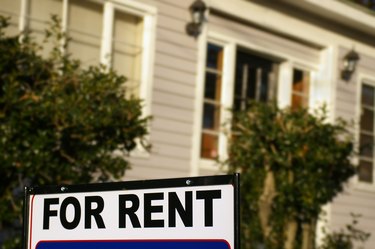Design District House for Rent

Finding rental homes at bargain prices may require professional help from an agent.
Image Credit: zimmytws/iStock/Getty Images
Buying a rental property differs from purchasing your own home because you consider factors that you may not take into account when buying your own house. Your mortgage options also differ because investment properties tend to be riskier than primary residences. Your income, plus the potential for vacancy, loss of rental income and maintenance expenses in your rental business make it harder to get a financing. Be prepared to scout rental homes, calculate rents and estimate maintenance costs when investing in a rental home.
Understand the Start-Up Costs
The expenses don't end with the home price and closing costs. A rental home must meet the landlord-tenant laws that govern residential rentals in your area. The home must be up to building code and habitable before you rent it out. A house in substandard condition is not only difficult to finance, it hurts your ability to collect rent if tenants decide to withhold payment or move out. A home in poor condition is also hazardous to tenant health and safety and a liability. Repairs, remodeling or major property rehabilitation adds thousands of dollars to your start-up costs for a rental.
Rentals Are Harder to Finance
You typically need a down payment of at least 20 percent to buy a rental house. You also need decent credit. Although lenders may accept scores down to 620, you face highest interest rates. You generally need at least a 740 to get the best rate. Lenders may also require you to have several months of housing payments as reserves. Six months' worth of the rental's principal, interest, taxes and insurance payments is typical. Certain loans may even require enough income to cover both your primary housing expense plus the rental-property payments, meaning you can't count projected rental income to qualify for the loan. For example, Freddie Mac loans require at least two years of landlord experience to use projected rental income for qualifying. Lenders generally don't allow a borrower to use gifted funds to cover the down payment or closing costs; you must use your own money.
Locate an Agent and Good Neighborhoods
Hire a real estate agent experienced in rental property sales. Agents can pinpoint investment properties with the most potential, helping to narrow down your search. Like any home purchase, location is key when buying rentals. A densely populated area with a high demand for rentals is a good place to buy, according to MSN Real Estate. Houses with more than one bedroom and bathroom located in low-crime neighborhoods also bode well for your bottom line. Proximity to public transportation, schools, shopping and amenities may also increase the value of your rental home.
Find Out the Rental Rates
You need to know the fair market rent your home is likely to fetch. This helps you set the rental rate and determine the purchase price that makes the most sense. Most landlords don't want to overpay for a home or end up in the red each month. If looking to make a profit each month, or at least break even, you must accurately estimate the rent amount you can charge and the total monthly expenses for your rental business. Fair market rents vary by location and property, therefore, ordering an investment-property appraisal may provide the best estimate of your probable monthly rent and income.
Design District House for Rent
Source: https://www.sapling.com/5098065/buy-house-rent-out
0 Response to "Design District House for Rent"
Post a Comment